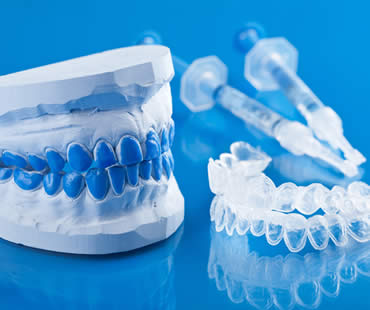
While life can be full of moments that are wonderful, there are days that just naturally stand out: your wedding, your graduation, a very special anniversary or birthday, or a big job interview you’ve always wanted. Many of these events are photographed, and when you look back at those photos in years to come, you naturally want to look your very best. Will you look back on your photos and wonder, could my teeth have looked better? The answer could be yes if your teeth aren’t the best and the brightest they can be.
Teeth are covered in enamel, a strong white coating on top of the internal structures of your tooth. As we age, enamel naturally wears away. Because it cannot be replaced naturally, the enamel thins, and the yellow layer of dentin beneath is exposed. This leads to smiles that are discolored and yellowed, appearing dingy and dim.
The foods we eat affect the brightness of our teeth, and some can begin to stain long-term. Beets, blueberries and blackberries can leave stains, as can tea, coffee, dark soda and red wine. Even soy sauce and balsamic vinegar can discolor your smile. If you have any crown, bridges or veneers, those structures aren’t affected by long-term stains, and can begin to stand out in unattractive contrast to your natural, darkening teeth.
Begin the process for your important day by scheduling an appointment with your dentist. Have your teeth examined and cleaned, and learn what teeth whitening procedures would best benefit your particular smile needs. Don’t wait until the last minute, as some whitening procedures take time to reach optimal effects. Some whitening methods increase the sensitivity of your teeth or surrounding gums. Planning ahead can allow your teeth some time to recover prior to your special event.
After your professional teeth whitening, you’ll be surprised at your self-confidence. Your mood will improve as you face those around you with your best and brightest smile, and everyone you meet will sense it. Love the photos you’ll be taking for years to come, and talk to your dentist today.
We look forward to seeing you in our Longview dental office

If you have just completed professional teeth whitening treatment, you probably want to protect your investment and extend the life of your shiny, bright smile. To enhance your healthy new smile and keep it white and bright, it’s important to follow a few simple guidelines:
- Do follow good oral hygiene practices by brushing and flossing regularly after every meal.
- Don’t drink colored beverages such as red wine, coffee, cola or tea immediately after treatment, and continue to avoid them whenever possible to prevent staining.
- Do drink beverages with a straw when you must drink dark-colored beverages to prevent the liquid from touching your teeth and causing stains.
- Don’t eat pigment-intense foods for several weeks after whitening. Berries, dark chocolate, soy sauce and other foods with a dark color can leave residue that leads to staining.
- Do use a gentle tooth whitening mouthwash after eating to rinse away food and debris that could cause staining and to keep your breath fresh.
- Don’t wear lipstick or colored gloss for at least one week after whitening treatment, as your teeth are still sensitive immediately after treatment and lipstick can leave pigments that will stain your teeth.
- Do use a whitening toothpaste to increase the results and aid in the longevity of your treatment.
- Don’t forget to eat a healthy diet and drink water to keep your teeth strong and vibrant.
A whiter smile can brighten your face and take years off your looks. By following these easy recommendations, you can extend the life of your whitening treatment and enjoy the benefits of your bright, new smile.
We look forward to seeing you in our Longview dental office

It’s part of life that your teeth will likely become dull and yellowed as you age and consume foods that contribute to teeth staining. However, you don’t have to go through life with a tainted smile. There are many options available these days for either at-home or professional teeth whitening. If you choose to brighten your smile, you’ll want to make sure you maintain the look as long as possible. Eating certain foods can help you naturally achieve the goal of a dazzling smile.
Citrus fruits:
Lemons, oranges, pineapples and other citrus fruits contain natural acids that help whiten teeth. Their tart flavor also promotes saliva in your mouth, which creates a natural rinse and polish over your teeth.
Strawberries:
Rich in vitamin C, strawberries can help prevent gum inflammation and other periodontal issues. They also contain malic acid as well as ellagitannins, which are antioxidants that help banish bacteria in your mouth.
Apples:
Chewing crunchy fruit like apples helps scrub your teeth to get rid of plaque and germs. Apples also have lots of malic acid, an ingredient in some toothpastes, which increases saliva to clean teeth and remove stains.
Pineapples:
An extra benefit of pineapples is bromelain, a compound that has cleansing and anti-inflammatory properties. It helps eliminate unsightly stains naturally.
Cheese:
Mineral ingredients like calcium and phosphorus give cheese an edge in strengthening your teeth. Cheese also contains protein that protects tooth enamel, and lactic acid that protects against tooth decay. Hard cheeses promote saliva production to clean your teeth.
Broccoli:
High in fiber, broccoli can help lower inflammation in your mouth and body. Crunching on raw broccoli cleans and polishes your teeth, and the iron content helps protect your teeth from damaging bacteria and acid.
Our dental office is located in Longview

If you have damaged or decayed teeth you may be considering options to restore both the look and function of your smile. Crowns and veneers are both utilized by cosmetic dentists to accomplish these goals. Which should you choose? Both crowns and veneers have pros and cons, and some distinct differences.
A crown is a cap that is placed over the tooth to reinforce the tooth and restore its original size and shape. Crowns are bonded into place and cover the entire tooth that is visible above the gum line. Crowns are most often used when the tooth has serious problems with structural integrity, often caused by decay. Cracked, broken, or worn down teeth also get crowns. Crowns modify how the tooth looks, and can help restore a more perfect smile. Crowns can be made of stainless steel, resin, porcelain, ceramic and other metals.
Veneers are similar to crowns in that they are used to restore the appearance of a tooth. Veneers utilize a thin shell of either porcelain or composite material that is placed over the tooth to protect it from damage and correct its appearance. Veneers require the structure of the tooth surface to be altered to bond it to the tooth.
Veneers are most commonly used to restore the outward appearance of a tooth, while crowns are typically used for structural repair. If your goal is simply to change the appearance of your teeth, veneers may be the best option. If you have extensive tooth decay or trauma, a crown might be the best choice. Consult with your dental professional to find out if a crown or veneers would be most appropriate for your specific dental issues.
If you need a dentist in Longview contact us today

Tooth stains, chips, cracks, and discolorations can keep you from letting others see your teeth. If you are self-conscious about your smile, then dental veneers may be the answer for you. Veneers can correct a variety of imperfections and give you a natural, beautiful smile.
What are dental veneers?:
Made from tooth-colored porcelain, veneers are attached to the front of your natural teeth. They feel just like the rest of your teeth, and are durable and do not irritate your gums. Since porcelain is resistant to stains, you’re able to eat and drink as you wish. Good oral hygiene helps keep veneers and your natural teeth strong and healthy.
What are the benefits of getting veneers?:
There’s a reason that veneers are one of the most popular options in cosmetic dentistry. They provide a solution to many problems and can dramatically improve the appearance of your smile. Veneers are the answer for tough stains or discolorations that can’t be repaired by teeth whitening. They can also make your teeth look straight and even. Veneers provide an answer for chipped or broken teeth too.
Are there any disadvantages?:
The main thing to remember is that your original tooth might need to be reshaped to a smaller size and shape to allow the new, thin coating of the veneer to be placed over it. The coating will make your tooth look like a normal, perfectly shaped tooth. However, if the veneer is ever removed, it would need to be replaced to keep your smile looking nice. Dental veneers are a life-long solution to creating your best smile.
We look forward to seeing you in our Longview dental office

If your desire is to transform your smile quickly and easily, dental veneers may be the way to go. They hide cosmetic problems that range from minor issues to very noticeable ones. Veneers are customized so that they give you the exact look you want for your new beautiful smile. These restorations, often made of porcelain, offer a variety of benefits to meet many needs.
Straightening:
Crooked, misaligned, or uneven teeth can be hidden with veneers. An impression will be taken of your teeth, which will be sent to a lab so that veneers can be created specifically for you. Once the veneers are finished, the dentist will attach them to your teeth to give you a perfectly straight smile without having to wear braces.
Strengthening:
If you have cracked or otherwise weakened teeth, you do not have to replace them in order to get dental veneers. Once the teeth are stabilized, veneers can be applied and actually act like a splint for your teeth. Veneers create a strong bond with your teeth and can even protect against tooth decay.
Durability:
Another benefit of veneers is their durability, as they can last up to 20 years. Caring for them just means proper brushing and flossing, and regular checkups. No changes to your diet are necessary, and porcelain veneers are stain resistant so they maintain their bright appearance.
Easy procedure:
Getting dental veneers is a painless process, and quicker than many other cosmetic procedures. You can get your new smile in just two or three appointments.
Natural:
Veneers are one of the most natural-looking ways to improve your smile. They look similar to real teeth because they reflect light naturally, and the thin material fits snugly to your teeth.
Versatility:
Veneers correct a variety of cosmetic dental problems. Examples include discolorations, stains, breaks, misalignment, overcrowding, and unevenness. Just about any aesthetic flaw you have with your teeth can be covered with veneers, giving you a brand new beautiful smile.
Our dental office is located in Longview









